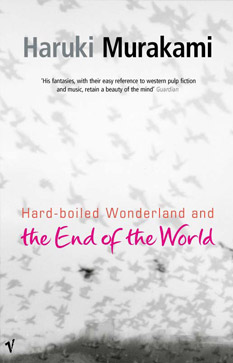Since Hard-boiled Wonderland and the End of the World is a Haruki Murakami novel, I thought I'd open with this image of "Murakami Bingo:"
This isn't to denigrate Murakami's novels. I've also read Kafka on the Shore, which I enjoyed even if I didn't really understand it. I'm also enjoying Hard-boiled Wonderland and the End of the World. Even if the worlds Murakami creates are utterly bizarre, he has a knack for isolating and bringing to the fore enough details to make them seem real. He has a knack for specificity. For example, this description of the elevator at the beginning:
Every last thing about this elevator was worlds apart from the cheap die-cut job in my apartment building, scarcely one notch up the evolutionary scale from a well bucket.* You'd never believe the two pieces of machinery had the same name and the same purpose. The two were pushing the outer limits conceivable as elevators.
First of all, consider the space. This elevator was so spacious it could have served as an office. Put in a desk, add a cabinet and a locker, throw in a kitchenette, and you'd have room to spare. You might even squeeze in three camels and a mid-range palm tree while you were at it. Second, there was the cleanliness. Antiseptic as a brand-new coffin. The walls and ceiling were absolutely spotless polished stainless steel, the floor immaculately carpeted in a handsome moss-green. Third, it was dead silent. There wasn't a sound—literally not one sound—from the moment I stepped inside and the doors slid shut. Deep rivers run quiet.
Another thing, most of the gadgets an elevator is supposed to have were missing. Where, for example, was the panel with all the buttons and switches? No floor numbers to press, no door open and door close, no emergency stop. Nothing whatsoever. All of which made me feel utterly defenseless. And it wasn't just no buttons; it was no indication of advancing floor, no posted capacity or warning, not even a manufacturer's nameplate. Forget about trying to locate an emergency exit. Here I was, sealed in. No way this elevator could have gotten fire department approval. There are norms for elevators after all.Themes (or should I say "motifs," since I learned in English class that a theme is always and only a whole sentence rather than a single word or idea) run strong in this book, and they're present right from the beginning: noise, silence, and evolution. Murakami handles them lightly; so lightly that I had totally forgotten that they had appeared as early as the first page. Wonderland seems so far more tightly bound to this sparse collection of motifs than Kafka, though I'd have to read the latter again (a third time!) to be sure.
I'm not far enough along to comment on how these motifs add or detract to the story; so far it gives everything a sense of connectedness. The story splits between one nameless male narrator who does some kind of futuristic wetware cryptography work (something like Johnny Mnemonic) and the story of another nameless male narrator who's arrived at The Town without his memory or his shadow. The worlds have their own separate logic but there are elements that tie them together—paperclips, skulls, "the end of the world."
I've heard good things about Wonderland; many of my friends agree that this one is Murakami's best work. So far it's not disappointing, but I can only hope that I'll better understand the ending of this one than Kafka on the Shore. In any case, reading Murakami's writng is a reward unto itself; you don't need to understand the story to really appreciate it.
A shout-out also goes to the English translator, Alfred Birnbaum. Reading novels or poetry translations from a foreign language means you're never reading just the world, but a translation of the work, and they can be good or bad. Birnbaum's is great, and the shift in tone between the two narrators is as much his work as Murakami's. Perhaps this speaks to my ignorance about the business side of the book world, but as Murakami has translated books from English to Japanese, (and I think I read something about him writing in English first and then translation to Japanese), wouldn't he translate his own novel?
Little matter, though, Birnbaum has done an admirable job here.
*I'm not counting this as a dried-up well for Murakami Bingo.



No comments:
Post a Comment